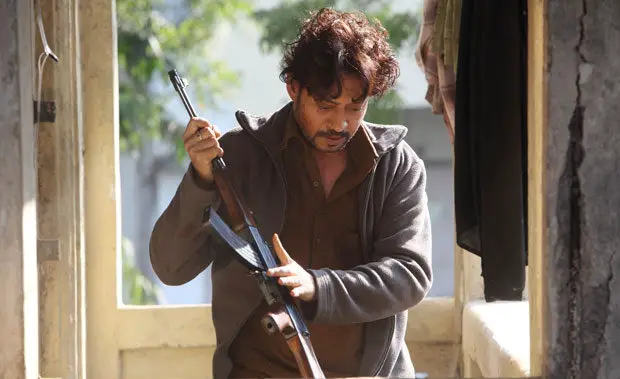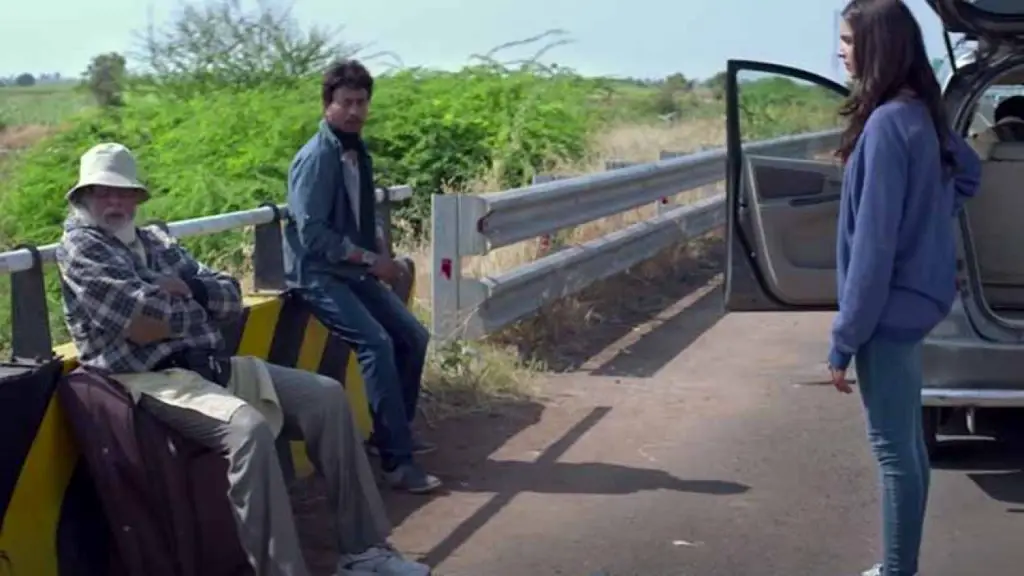Lives lived in cinema have such a deep, cultural impact on us that it almost gets difficult to draw boundaries between the real and the reel. With many cinematic entries and exits over the course of an illustrious career, with the many on screen lessons in holding on and letting go and with several films which work as pieces of ethereal music, binding us all together, the legacy which Irrfan Khan left behind is truly unparalleled.
On the morning of April 29, 2020, I strangely found myself listening to ‘Farewell Ashoke,’ a piece of instrumental music in The Namesake’s musical album. Little did I know that I would actually be bidding farewell to one of the finest actors we ever had in India and beyond. Irrfan Khan.
Although, it is difficult to say goodbye for real, the one goodbye I can offer Irrfan, is recalling his finest works:
1. In the realm of Crime and Drama: Talvar (2015), Haasil (2003), D Day (2013), Qissa (2013)

As Ranvijay Singh in Haasil, Agent Wali Khan in D Day and Ashvin Kumar in Talvar, Irrfan unleashes a potential, unmatched and inimitable. Playing significant roles in each of the three, he proves his credibility for both mainstream and non-traditional cinema; every performance a masterclass in acting. The actor balances intensity with a restrain that only a few can. From gunfights to detailed investigative themes, he has explored a range of opportunities in this genre spanning throughout his body of work.
Qissa, an Indo-German production helmed by Anup Singh showed Irrfan in a unique light, unlike anything you’ve seen before. The Punjabi drama had him play the role of a Sikh by the name of Umber Singh. The film (featuring Tisca Chopra, Tillotama Shome, Rashika Dugal) didn’t just boast splendid performances but possessed a realism that is hard-hitting.
Recommended: 14 Best Indian Thrillers On Amazon Prime: Tamil, Hindi, Malayalam
2. Beti Padhao, the Irrfan Khan Way: Hindi Medium (2017), Angrezi Medium (2020)
His very last film, Angrezi Medium is possibly the most emotional watch for the Irrfan Khan fandom. It was also the last one in the theatres for many, before Covid changed our lives forever. Addressing social issues around the larger rubric of education through a pinch of humour in his performances in both the films, Irrfan excels in his grounded depiction of atypically non-patriarchal Indian fathers.
The wholesome feeling that both the films leave the viewers with, stems from his intricate, nuanced portrayal of Raj Batra (Hindi Medium) and Champak Bansal (Angrezi Medium). They effectively capture the essence of the very fabric of the Indian education system, the desires of a student, the desires of the parents and frequent collisions between the three. The films are social commentaries and examples of efficacious storytelling.
3. Smaller Roles, Greater Power: Darjeeling Limited (2007), Salaam Bombay (1988), Slumdog Millionaire (2008)
Right from his debut, Irrfan Khan has been contributing significantly to the growth of India’s representation in the realm of the international. Although it is to everyone’s common knowledge, it is key to reiterate here that Irrfan was initially set to play a longer part in Mira Nair’s Salaam Bombay. It was only later that he was asked to do the minuscule role which required his screen presence for mere one scene. Playing the road-side letter writer; Irrfan leaves an indelible mark on the film through his curt replies, and his innate ability to express more with his eyes than dialogue.
Collaborating with Wes Anderson by successfully fitting into a bucolic in Darjeeling Limited, he added vibrance to each frame he graced. In the 2008 film, Slumdog Millionaire, he plays the character of a police inspector in the city of Bombay, which is as urbane as it gets. The sheer versatility with which he rendered his characters was beyond commendable.
4. Fighter Figure: The Warrior (2001), Paan Singh Tomar (2010)
Both momentous films in his career, the BAFTA award winning The Warrior and the commercially successful Paan Singh Tomar allowed Irrfan to play athletic characters, and also endowed him with a renewed fervour for acting. While The Warrior renewed Irrfan’s faith in his acting career, it is also interesting to note that he had not tasted much commercial success in the Hindi film industry before Paan Singh Tomar. Both films are remarkable allegories of the fighter and the skilled artist that he was.
5. Subjects of International Acclaim: Puzzle (2018), Inferno (2016), A Mighty Heart (2007), The Amazing Spiderman (2012), Jurassic World (2015)
The global entertainment market was most welcoming towards Irrfan. And all these films are symbolic of the representation Irrfan garnered in the International community, for India and brown artists. As Robert, Agnes’ puzzle partner in the Marc Turtletaub directorial Puzzle, Irrfan excels even though the film escapes its share of well deserved reception.
Directed by Michael Winterbottom, A Mighty Heart proved to be a big step towards Irrfan’s international success as he starred in the film alongwith the likes of Angelina Jolie. While winning compliments from Tom Hanks, for being ‘the coolest guy in the room’ during the shooting of Inferno were not enough, his role in other Hollywood projects such as Jurassic World and The Amazing Spiderman platformed his skill to a wider audience.
6. Tracing Roads: Piku (2015), Karwaan (2018)

The two travel films in which Irrfan starred, are simple, yet extremely powerful journey narratives centred around road trips. Paired alongside Deepika Padukone in the Shoojit Sircar’s Piku, Irrfan dons the character of Rana Chaudhary and carves out a character trajectory that is not just heartwarming to watch, but also unique in itself. From a taxi driver to Piku’s confidant, he plays with the many possibilities inherent in the subtleties of this character. It is in his rendition of Rana, that the driving force of the film lay.
In debutant director Akash Khurana’s Karwaan, he is seen as Shaukat, the protagonist’s friend. Even here, the element of romance is similar and light-hearted, yet brave in its own beautiful way. The Guardian defines him as a ‘seductive actor capable of exquisite gentleness’, and we are not surprised.
7. The Slice of Reel Life Romance: Life in a… Metro (2007), The Lunchbox (2013), Qarib Qarib Singlle (2017)
What is strikingly fascinating about clubbing these films together, besides them being three delicate love stories, is that they are thematically related. While in Life in a... Metro, Shruti meets a rather honest-to-goodness Monty (played by Irrfan Khan) through a matrimonial website; in Qarib Qarib Singlle, Jaya meets Yogi (again, played by Irrfan Khan) through a dating website. Their journeys in the respective films are also similar, owing to the similarity of their origin story.
Another interesting thing to note would be, how in both Life in a... Metro and The Lunchbox, the city of Mumbai plays a prominent role in the nature of the love that blooms between people. These three films stand as impeccable examples of abstruse romances that develop between strangers in a big city (or in the case of Qarib Qarib Singlle, several cities), and they serve to bring out what is possibly the most easily ignored side of Irrfan’s performative merit.
8. A Long-Standing Friendship: Haider (2014), 7 Khoon Maaf (2011), Maqbool (2003)
After Irrfan Khan’s passing, the one person who penned down their journey together in the most poignant way possible, was Vishal Bhardwaj. Sharing moments from pre production to post production, from the lot of his films that Irrfan Khan acted in, he wrote an 18 page screenplay dedicated to his friend.
It wouldn’t be wrong to say that no other performer could have embodied Macbeth with the rustic charm that Khan did. He possessed the skill and the finesse required to make pre-existing characters his own, by incorporating unique elements to a modernised context for the adaptation to work in the Indian milieu. Roohdaar, based on the ghost character from the Shakespearean play Hamlet, is essentially the rooh (soul) of the film.
Even in the limited screen time given to him in Haider, Irrfan brilliantly justifies his presence. 7 Khoon Maaf, adapted from a short story by Ruskin Bond, sees him play Wasiullah Khan, displaying a kind of unique and demanding bipolarity of character with effective ease and unparalleled mastery.
9. Shorts: Bypass (2003), The Cloud Door (1994), New York, I Love You (2008), Migration (2008)
These are some of the rather lesser-known gems that Irrfan Khan has lent a piece of himself to. Besides Vishal Bhardwaj, Irrfan shared a special equation with Mira Nair. As a part of the director’s anthology New York, I Love You, he played a Jain diamond dealer, who is in love with a Jewish Natalie Portman. As bizarre as that sounds, it is intriguing enough for a watch.
In Migration, another short by Nair, he is seen in the role of a gay man who cheats on his wife. And it is in smaller roles like these that the real grit of an actor reflects.
In Mani Kaul‘s The Cloud Door, despite the challenges of less than limited screen time, Irrfan manages to make his unique presence felt. Appearing in a silent part alongside a parrot, he is distinguishable and utterly radiant.
In Amit Kumar’s Bypass, he shares the screen in the silent role of a police officer alongside Nawazuddin Siddiqui. Irrfan delivers one of his strongest performances, never letting the absence of words overpower his stellar act at show.
10. Of Letting Go: The Namesake (2006), Life of Pi (2012)
In testimonials of Irrfan’s many legacies, these two films are constantly resurfacing for their philosophical undertones. What sets them apart from the others are their emotionality and the simplistic connect Khan develops with his audiences. In both these adaptations helmed by internationally acclaimed directors, Irrfan shines the brightest in terms of his acting. But what truly makes both these films memorable, is the accuracy with which the characters played by Irrfan include remnants of his own fate.
The filmic trajectories in both these pieces of cinema resemble Irrfan’s actuality. From the suddenness of his death as Ashoke Ganguli in The Namesake, to the moment when he tells us ‘what hurts the most is not taking a moment to say goodbye.’
Right from the apt pairing from Maqbool, to the literary genius of Jhumpa Lahiri that reflects in the dialogue of the film, The Namesake has truly immortalised our Ashoke as ‘the best of the lot’. On the other hand, Life of Pi forever iconised Irrfan Khan. A scene from this particular film that will always be a cinematic obituary to Irrfan Khan’s wider legacy. ‘I suppose, in the end, the whole of life becomes an act of letting go.’
Is it a perfect obituary? Or can we never let go?
By Sanghmitra Jethwani
Recommended: 50 Must Watch Bollywood Movies of the 21st Century

